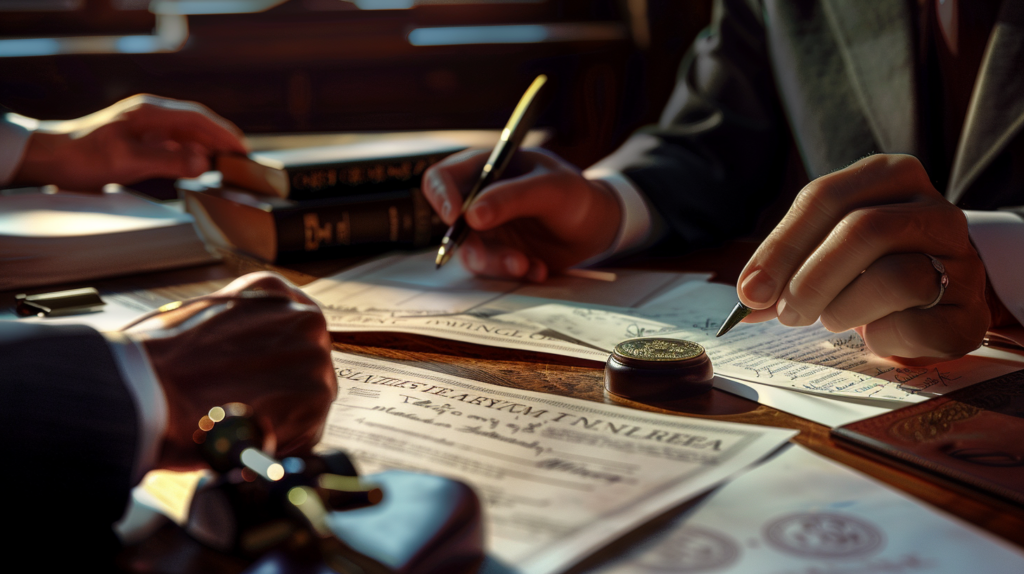
The rule regarding this question is quite simple: You cannot notarize your own documents, as this is universally prohibited across all 50 states. This rule prevents conflicts of interest and ensures that notarization remains impartial and valid. As a notary, your role is to act as an impartial witness to the signing of documents. Notarizing your own papers could compromise both the integrity and legality of the act.
Additionally, always seek a third-party notary to handle your document to maintain unbiased identity verification and legal compliance. We’re going more in-depth to answer any potential questions you may have.
When you're considering notarizing personal documents, you have to remember the definition of the notary role - where integrity and validity are the core principles. By seeking a third-party notary, you ensure that identity verification is conducted without bias, preserving the trustworthiness of the notarial act.
Moreover, the prohibition of self-notarization highlights the importance of impartiality—a cornerstone of notarial practice. This impartiality is compromised if you attempt to notarize your own documents, as it can lead to questions about the authenticity and legality of the document.
While self-notarization is off-limits, you may wonder about the possibility of notarizing documents for family members. In some states, you can indeed notarize documents for family members, but it's important to be careful to avoid any conflicts of interest. As a notary, your role demands you uphold the utmost standards of integrity and professionalism, regardless of the signer's relationship with you.
To ensure compliance, you must rigorously verify the identity of your family members, just as you'd with any other signer. This involves checking valid identification to confirm their identity, which is a cornerstone of notarization. You must also guarantee that your family members fully understand the documents they're signing, ensuring that all actions are transparent and above board.
Maintaining impartiality is essential. You shouldn't notarize documents in which you have a personal interest or stand to gain from directly. This is to preserve the integrity of the notarization process and to prevent any appearance of bias or favoritism. Adhering to these guidelines helps protect both your professional reputation and the validity of the notarized documents.
Fortunately, technologies like Remote Online Notarization (RON) offer a convenient and secure alternative. RON eliminates the temptation and need for self-notarization by providing a platform where a remote notary can verify your identity and handle the notarization process electronically.
This method adheres to the requirements of impartiality and enhances the efficiency and accessibility of notarizing documents. Remember, adhering to these protocols isn't just about following the law—it's about ensuring that your documents hold up under legal scrutiny.
Before you utilize remote notarization services, it's important to properly prepare your documents to ensure a smooth and efficient process.
Start by gathering all necessary documents that need to be notarized. Ensure that each document is complete and free from any blanks, as this can prevent a notary from performing their duties.
Ensure that each document you present for notarization is clearly legible and contains all necessary signatures except for the one that requires witnessing by the notary. Double-check that personal identification documents, which will be needed to verify your identity during the notarization process, are current and valid.
How often are common notarization errors overlooked, potentially compromising the integrity of the process? You’d be surprised.
Mistakes such as self-notarization or notarizing documents for close family members inject conflicts of interest, which not only undermine the notary's impartiality but also risk significant legal challenges.
Moreover, notarizing documents in which you have a personal or financial interest is another common error. This action can invalidate the notarization and potentially nullify the document itself, leading to complications in any related legal proceedings.
The most common mistake you might make as a notary is failing to properly identify the signer according to state requirements, which is crucial for ensuring the legality and validity of the notarization.
You can't notarize documents for your spouse, as it creates a conflict of interest and compromises the integrity of the notarization process. Consider finding another notary for such instances.
You can't notarize your own documents, as doing so violates ethical standards and legal requirements, ensuring impartiality and integrity in the notarization process. Always have another notary handle your personal documents.
Most notaries charge between $5 to $15 per notarization, but fees can vary based on state regulations and the specific services provided. Always check your state's guidelines to ensure accurate pricing.
Notarizing one's own document is considered a violation of notarial ethics and state laws. It can lead to legal penalties, revocation of the notary's commission, and the document being deemed invalid.
While some states allow notaries to notarize documents for family members as long as they do not have a direct interest or benefit from the document, many states discourage this practice to avoid potential conflicts of interest and preserve the integrity of the notarization.
There are no exceptions; notaries must always avoid notarizing their own documents to uphold the credibility and integrity of the notarization process.
REGISTER AS A NOTARY ON OUR PLATFORM
Every notary registered gets an additional complimentary listing on our partner site - www.notarypublicdirectory.com
As a notary, you can't notarize your own documents or those of close family members due to legal and ethical constraints. It's crucial to uphold the integrity of the notarization process by remaining impartial.
Always follow document preparation guidelines and be mindful of common notarization errors. With advancements like online notarization and tools like the Notary Journal App, you can enhance the efficiency and security of your notarial acts, shaping the future of notarization.